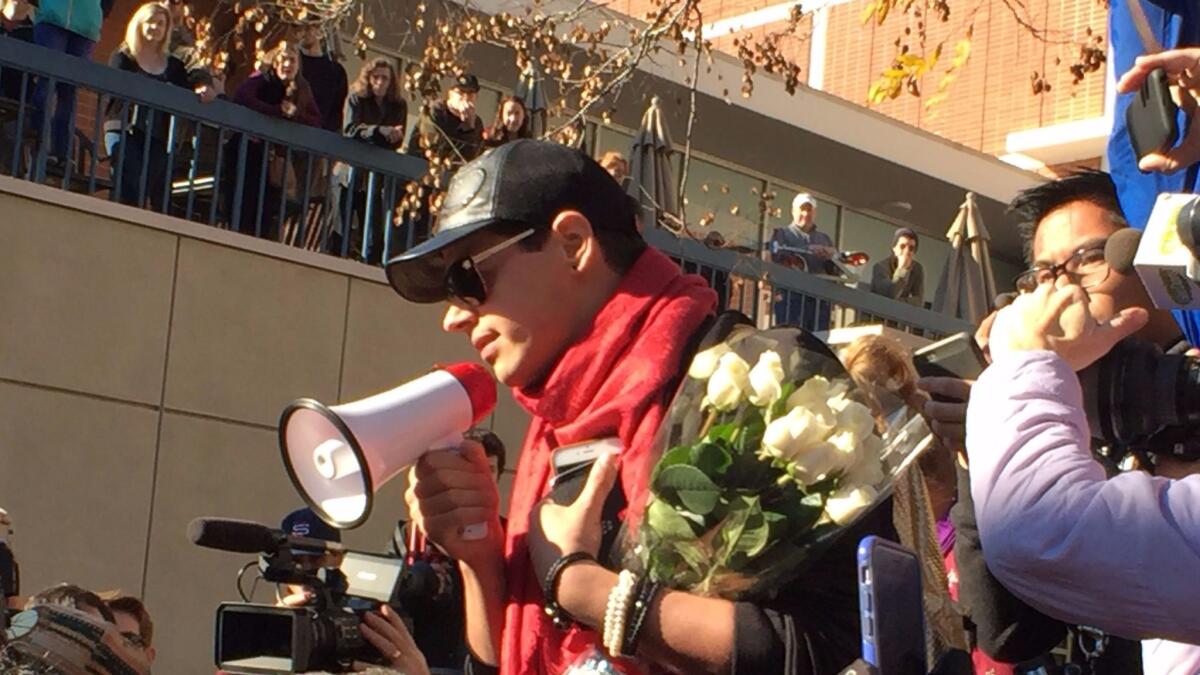UC protests shut down Milo Yiannopoulos talk, sparking free speech debate

- Share via
Conservative firebrand Milo Yiannopoulos and former pharmaceutical executive Martin Shkreli were supposed to speak Friday at UC Davis.
But protests prompted officials to cancel the event, sparking a debate about free speech.
Q: What exactly happened Friday night?
Several hundred protesters, chanting and yelling, managed to shut down the event, billed as the first stop on Yiannopoulos’ “Dangerous Faggot” college campus tour.
Yiannopoulos and some others characterized the protest as “violent” but others disputed that. Campus police said there was no violence or property destruction. No arrests were made.
The Times’ Robin Abcarian on the “violent” characterization: “I was there and that’s not how I saw it. There were definitely a lot of raised voices. UC Davis police officers, having been singed by the famous pepper spray incident of 2011, in which one of their men brazenly sprayed peaceful seated protesters, were surprisingly passive. If you’d been there, you might have wanted to cover your ears from the noise, but to allege violence is to be guilty of the same snowflake sensibility that right-wingers love to fling as an insult when they denigrate the concepts of ‘safe spaces’ and ‘trigger warnings.’”
Q: Why was the talk cancelled?
After consulting with university police, Davis College Republicans decided it was unsafe to continue the event after a large number of protesters blocked access to the venue, according to a release from the school.
Q: How did the university respond?
UC Davis Interim Chancellor Ralph Hexter said he was “deeply disappointed” by the protests and the cancellation.
“Our community is founded on principles of respect for all views, even those that we personally find repellent,” Hexter said in statement after the cancellation. “As I have stated repeatedly, a university is at its best when it listens to and critically engages opposing views, especially ones that many of us find upsetting or even offensive.”
Q: How about Yiannopoulos?
Yiannopoulos took to Facebook on Saturday, attacking both the university and the protesters. And he returned to campus that afternoon.
He stepped onto a tree planter and spoke into a megaphone, accusing the university of pandering “to Black Lives Matter and feminist groups, no matter how hateful and divisive they are.”
Yiannopoulos writes for the Breitbart.com website and is permanently banned from Twitter after leading a harassment campaign against “Ghostbusters” actress Leslie Jones. Shkreli, who increased the price of an AIDS drug before being indicted on federal securities fraud charges, was recently suspended from Twitter over “targeted harassment” of a journalist.
Q: And students?
Some told Abcarian they were disappointed that the talk was cancelled.
“Freedom of speech is meant for speech that is controversial,” said Christan Santos, a 20-year-old San Jose State student and Trump supporter. Santos said he was put off by Yiannopoulos’ campaign of insults against Leslie Jones, but added, “We need to respect our differences and engage.”
More to Read
Sign up for Essential California
The most important California stories and recommendations in your inbox every morning.
You may occasionally receive promotional content from the Los Angeles Times.











